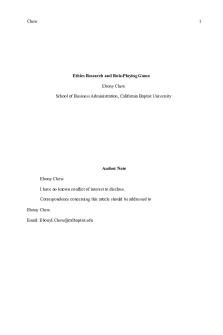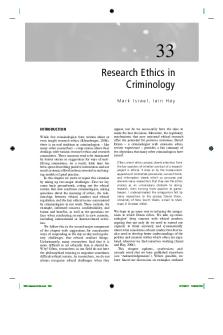TCP 2 Answers Research 101 for ethics PDF

| Title | TCP 2 Answers Research 101 for ethics |
|---|---|
| Author | Toby Baj |
| Course | Business research Method |
| Institution | Humber College |
| Pages | 3 |
| File Size | 79.1 KB |
| File Type | |
| Total Downloads | 201 |
| Total Views | 435 |
Summary
Correct Answers Research ethics boards are composed of (select all that apply) : At least one community member who has no affiliation with the institution. At least two members who have expertise in relevant research disciplines. According to TCPS 2, the amount of financial compensation or an in...
Description
Correct Answers 1. Research ethics boards are composed of (select all that apply): At least one community member who has no affiliation with the institution. At least two members who have expertise in relevant research disciplines. 2. According to TCPS 2, the amount of financial compensation or an incentive that is offered to participants must be directly proportional to the level of risk imposed on them by the research. False 3. Canadian researchers who plan to recruit participants only from outside Canada are not required to seek REB approval from their institution because the mission of TCPS 2 is to protect Canadian research participants. a. False 4. In order to identify prospective participants who may be in a position to help answer specific research questions, it can be ethically acceptable to engage with some individuals or their community before seeking REB review and approval of the research project. True 5. Program evaluation activities do not constitute research for the purposes of TCPS 2 True 6. According to Chapter 9 of TCPS 2, researchers cannot conduct critical inquiries of the governance of Indigenous institutions. False 7. As the main policy document for research ethics in Canada, TCPS 2 supersedes provincial and territorial legislation. False 8. What are the three core ethical principles of TCPS 2? Respect for persons, concern for welfare, justice 9. Research involving only minimal risk does not need to be
reviewed by the full REB. The review may be delegated to one or more members of the REB. - True 10. Under TCPS 2, research involving the secondary use of anonymized information does not require REB review. - False
11. Participant consent may be obtained in ways other than in
writing. - True 12. What is the central value underlying TCPS 2? - Respect for human dignity 13. The current version of the Tri-Council Policy Statement was adopted in 1998 by the three research funding agencies of Canada. - False 14. Researchers shall report to the REB any unanticipated issues or events that may increase the level of risk to participants. - true 15. Researchers who appear to be in a position of conflict of interest shall not be involved in any stage of the research. - False 16. Researchers are the ones who should be deciding on whether a material incidental finding must be communicated (or not) to the participant. a. false 17. Which of the following statements is/are true (select all that apply)? - According to TCPS 2, consent should be voluntary, informed, and ongoing. - In the great majority of cases, consent should be obtained prior to a participant’s involvement in the research. 18. Which of the following statements is/are true (select all that apply)? - For research involving the secondary use of non-identifiable information, researchers shall seek REB review, but are not required to seek participant consent. - REB review is not always required for research involving secondary use of anonymous information. 19. What are the three core ethical principles of TCPS 2?
- Respect for persons, concern for welfare, justice 20. What is the TCPS 2 approach to the ethics review of research projects? - Proportionality 21. Research does not require REB review when it relies exclusively on (select all that apply):
Information that is publicly available through a mechanism set out by legislation or regulation. - Secondary use of anonymous information, so long as it does not generate identifiable information. 22. If the REB determines that the targeted population and prospective participants have the capacity to decide for themselves to participate in this study, must the REB also require that the researcher seek the authorization of a parent or authorized third party prior to the participation of minors in this context? - No 23. Which of the following statements is/are true (select all that apply)? - There are circumstances that permit a departure from the general principles of consent. - In the great majority of cases, consent should be obtained prior to a participant’s involvement in the research. -...
Similar Free PDFs

PA Ethics 101 Quiz4
- 4 Pages

ENG 101 Research Assignment
- 2 Pages

Research Ethics 2021
- 39 Pages

Ethics in Conditioning Research
- 6 Pages

Introduction to Research Ethics
- 40 Pages

Work ethics research paper
- 8 Pages

Ethics Research Role-Play
- 5 Pages

Research Ethics in Criminology
- 15 Pages

Ethics in Conditioning Research
- 8 Pages

Lab4b TCP - TCP lab material
- 6 Pages

Research Ethics Class - Q & A
- 45 Pages
Popular Institutions
- Tinajero National High School - Annex
- Politeknik Caltex Riau
- Yokohama City University
- SGT University
- University of Al-Qadisiyah
- Divine Word College of Vigan
- Techniek College Rotterdam
- Universidade de Santiago
- Universiti Teknologi MARA Cawangan Johor Kampus Pasir Gudang
- Poltekkes Kemenkes Yogyakarta
- Baguio City National High School
- Colegio san marcos
- preparatoria uno
- Centro de Bachillerato Tecnológico Industrial y de Servicios No. 107
- Dalian Maritime University
- Quang Trung Secondary School
- Colegio Tecnológico en Informática
- Corporación Regional de Educación Superior
- Grupo CEDVA
- Dar Al Uloom University
- Centro de Estudios Preuniversitarios de la Universidad Nacional de Ingeniería
- 上智大学
- Aakash International School, Nuna Majara
- San Felipe Neri Catholic School
- Kang Chiao International School - New Taipei City
- Misamis Occidental National High School
- Institución Educativa Escuela Normal Juan Ladrilleros
- Kolehiyo ng Pantukan
- Batanes State College
- Instituto Continental
- Sekolah Menengah Kejuruan Kesehatan Kaltara (Tarakan)
- Colegio de La Inmaculada Concepcion - Cebu




